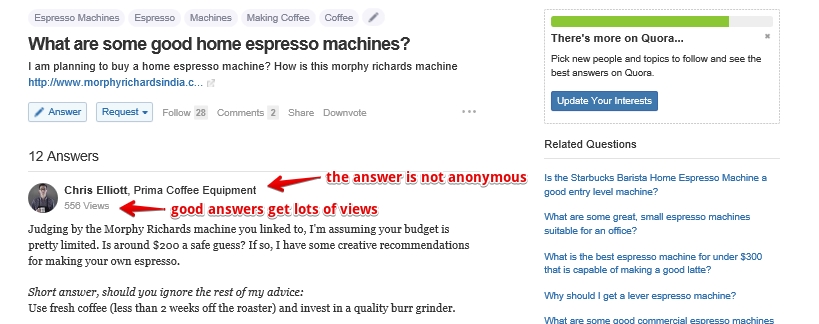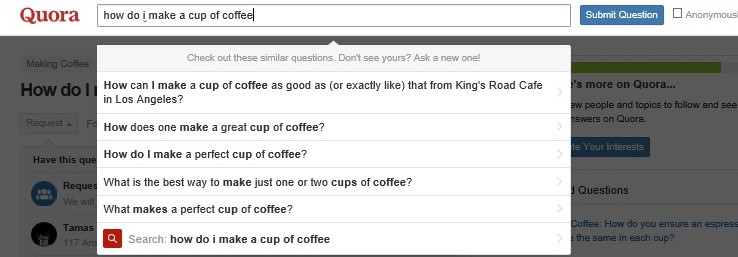I love getting my daily Quora Digest newsletter because the emails are filled with answers to intriguing questions such as the following:
- Inbox Dollars - Get paid to check your email. $5 bonus just for signing up!
- Survey Junkie - The #1 survey site that doesn't suck. Short surveys, high payouts, simply the best.
- Nielsen - Download their app and get paid $50!
As you can see, Quora differentiates itself from Wikipedia because the questions and answers are a bit…unexpected. Maybe a bit on the weird or improper side.
Quora was the brainchild of a Faceboom ex-CTO and began its public life in June of 2010. The site operated fairly quietly until it happened to get its moment of fame from a mention in TechCrunch. While this information is self-reported by Quora itself and may or may not be true, the platform does get an estimated 1.5 million worldwide viewers each month.
What is Quora?
Quora is a knowledge center akin to Wikipedia and AskJeeves…except that it’s also a social platform akin to Facebook, Google+ and the old version of Helium. Users can ask questions via the platform, and other users can answer them. Good and informative answers are “Upvoted” and rise to the top of the site; some are even featured in the Quora Digest, a daily newsletter that is sent out to users.
In addition to upvotes, Quora enables downvotes, follows, shares and comments. In 2013, Quora enabled its users to become authors by adding a blog platform.
There is no anonymity on Quora, at least for its users. When you ask or answer a question, you are acknowledged online. Note the following answer submitted by Chris Elliott:
So, why is Quora a place that you, an affiliate (or other) marketer, should be taking advantage of? Because the platform offers several major opportunities that should not be overlooked. Here they are…
1. Authority
As an affiliate marketer, one of your major challenges is to establish yourself as an expert in your niche. You audience isn’t interested in someone who is a newbie.
That’s where Quora comes in. It’s fairly easy to become a Quora member- you simply provide your name, email and desired password on the site. You can also have Quora link to your Facebook, Google or Twitter account and import the information from there.
That done, you are provided with a profile page that can be filled out to include your bio, including your occupation, education, geographic residences over time, etc. You can also add your areas of expertise.
Based on the topics you select, you will be offered the opportunity to follow users in your niche. Quora will also have you personalize your news feed and go through several layers of specifying exactly which notifications you wish to receive.
Once your profile is complete, you can build your authority on Quora by searching for and answering questions within your niche. You might also want to blog about niche-related topics. As your answers are posted, users will either upvote, downvote, comment on or share the content.
Because each of your answers will feature your profile photo and bio, a good answer from you in your specific niche will build your authority and number of followers. If you post your affiliate website URL or other information on Quora, users will eventually go there for more information. Which leads to…
2. Traffic
Arguably, one of the biggest issues that affiliate marketers face is how to generate traffic to their blogs, websites and product pages. Using Quora, you can list your websites and affiliate pages directly inside your bio by editing it:
Doing so invites users to visit your sites to learn more about your niche topic and products- and about you.
Quora is also getting noticed by Google. When I performed the following query on Google, a Quora-generated answer came up as the second search result:
No joke. Here are the fastest ways to make easy money online. Click here to see how.
To encourage traffic streams to your Quora profile (and beyond), you can easily embellish your profile with a host of goodies including your linked social media accounts, blog posts, outside content and posts, and even repurposed articles.
However, the bread-and-butter of your traffic generation is going to be the in-depth and carefully researched answers that you post to questions presented within your niche. Overall, you should seek out those questions that have few or no answers posted yet. You’ll get more traffic from those answers simply because you’ll be one of the few ‘answerers’ on that page.
Try to seek out and answer fresh questions that have a lot of upvotes on them. Once you do, you can answer them and then link back to your own Quora blog or website for more information. After all, the end goal of generating all that traffic is to direct it back to you.
3. Content
Content generation is relatively easy for someone who has a fresh blog or website and a head full of great ideas. Six months down the road, those great ideas have been exhausted and the impetus to keep blogging is long dissipated.
That’s when Quora excels. Because the site enables you to input questions and have them pre-filled with suggestions (much like Google search) prior to the completion of your inquiry, you can obtain lots of content ideas.
To start generating content ideas from Quora, start typing a question that contains some targeted keywords into the search area of the site. Then, focus on finding related questions that are getting lots of upvotes and attention and use them as launch points for adding content to both your own website(s) and your Quora blog.
Here is an example search I performed by asking how to make a cup of coffee:
If I had a blog focused on coffee, there are several related questions here I could use as an article-generator.
Quora isn’t like its oft-compared-to cousin Wikipedia. Whereas the latter features objective, heavily edited and reviewed content, Quora maintains a first-person collection of personal anecdotes, opinions, jokes and even biases. As a result, the content you read is more likely to be a true representation of user (and your customer) sentiment.
It’s also much easier to become a Quora contributor than a Wikipedia contributor, and to use Quora to subtly promote your business.
The Bottom Line
Quora is an emerging player in the quality content landscape that also incorporates key aspects of a social media platform. Therefore, you should consider taking advantage of Quora for your marketing efforts. At the very least, you’ll learn some interesting facts and end up engaging with a community of niche experts who’ll give you additional ideas on how to grow your affiliate marketing efforts.










